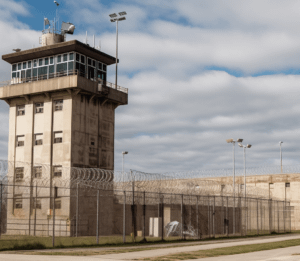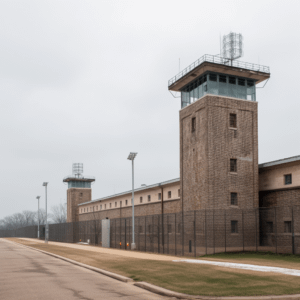The US holds the current world record for the largest population of people kept in privately owned prisons. Around eight percent of incarcerated people in the United States are currently detained in a prison that is owned and operated by a private company, as opposed to the government. The private prison industry has expanded by about 14 percent over the last 20 years. In some states, such as Montana, approximately half of the incarcerated population is kept in private prisons.
Private prison fraud causes real harm to incarcerated individuals, taxpayers who fund the criminal justice system, and anyone who hopes that incarceration leads to rehabilitation and reform. If you work in a privately-owned prison, have been detained in one, or are a family member of someone who has been incarcerated, you may be able to report private prison fraud. Community members and other employees and professionals in the justice system may also be able to spot and report private prison fraud and abuse.
This kind of government contract fraud cannot be tolerated. Whistleblowers who report private prison fraud may be eligible for substantial rewards and protections. If you work in corrections or other connections to a private prison and suspect that fraud is taking place, contact the law firm of Tycko & Zavareei LLP today for a free and confidential consultation.
What is Private Prison Fraud?

Private prison fraud is typically committed by abusing government contracts. In the current penal system (local, state, or federal), certain prison facilities are run by private companies that have submitted bids to the government for their services. The government pays these institutions, usually on a per-inmate basis, for what they can provide, as opposed to taking on the costs of jailing, guarding, feeding, housing, and providing care for inmates directly.
It is worth noting that private prisons do not only detain those who have been convicted of crimes. Private prisons in the US also currently operate with 13,000 beds reserved for immigrant detention. Therefore, private prison fraud may affect a broader portion of society than one might assume.
Examples of Private Prison Fraud
Below are some common examples of private prison fraud. Please bear in mind that this list is not exhaustive.
If you have concerns that the actions of your employer or facility may be against the law, it is always best to discuss the details with a qualified qui tam attorney. Our experienced staff can help protect your anonymity to the fullest extent possible.
Some examples of private prison fraud include:
- Healthcare fraud: In 1976 the U.S. Supreme Court ruled in Estelle v. Gamble that prisoners have a constitutional right to receive adequate medical care. In 2015, $8.1 billion was spent on inmate healthcare across all of the country’s departments of correction. If a prison uses this funding for purposes other than providing prisoners with medical care, it is considered fraud.
- Obtaining government funding under false pretenses: Detention centers are expected to accurately report their bed capacity, security, healthcare infrastructure, and more. If a contractor misrepresents any aspects of their prison’s operations in order to obtain government funding, it would be an example of private prison fraud.
- Contract violations: A common contract violation is a failure to meet the expectation for the number of staff members available to manage a prison operation. Any instance of not following the guidelines expressed within the specifics of a private prison government contract can be an example of reportable fraud.
- Abuse of prisoners: If a correctional facility accepts government funding and then mistreats the inmates in their care, this is viewed as fraudulent activity under the law. Abuse can be physical, psychological, or sexual in nature.
- Accepting funds for services the facility cannot accommodate: If a privately-run prison accepts money for high-risk prisoners but does not have the infrastructure, training, or necessary staff to house them safely, it would constitute state or federal government contract fraud.
Private contractors failing to follow guidelines or meet responsibilities: In one real-world example, the Arizona government contracted with the IT company “Business & Decision” for the creation and maintenance of an automated system that would calculate each prisoner’s projected release date. The company received over $24 million to ensure that this process ran smoothly. However, two whistleblowers reported in 2021 that the software had been malfunctioning for at least a year, leaving Arizona inmates serving sentences much longer than their legal release dates. Even worse, the Chief Information Officer and Deputy Director of the company allegedly knew about the mistake in the software since 2019 and failed to rectify the situation. This kind of coverup with a private prison company that is getting paid by the government is actionable under the False Claims Act.
- Failure to meet “Performance Based National Detention Standards” (PBNDS): This minimum level of care especially affects those who are being kept in private prisons due to US Immigration Customs & Enforcement (ICE) detention. Performance Based National Detention Standards are revised semi-regularly in order to ideally improve access to healthcare services, religious and legal services, visitations, communication with non-English speaking detainees, and responses to complaints. For-profit prisons that fail to uphold these standards may be subject to contract violations.
- Kickbacks: Judges who receive kickbacks for sentencing may be considered complicit in private prison fraud. Judges cannot receive payments or incentives for how they decide to sentence those who have been convicted of crimes. Likewise, governors or other state officials cannot use financial incentives to detain immigrants in for-profit centers. The payment or receipt of so-called “kickbacks” is an example of fraud.
- Obtaining a government contract through bribes, bid-rigging, or other illicit means: Bribery, under-bidding, bid-rigging, or other kinds of efforts to reduce competition or offer unfair financial incentives to receive a contract to construct or maintain a private prison is a method of government contracting fraud.
- Abuse of detainees in privately-run ICE facilities: Some examples of abuse may include subjecting detained individuals to forced medical procedures, forced labor, unwanted sexual advances, or more maltreatment. Private prisons or detention centers that receive government funding can be prosecuted under the False Claims Act for contract fraud if they subject those under their supervision to abuse.
The False Claims Act and Private Prison Fraud

Private Prison Whistleblower Rewards
Whistleblowers who report private prison fraud may be eligible to receive up to 30 percent of the government’s total settlement under the False Claims Act. This law allows whistleblowers to receive anywhere from 15 to 30 percent of the entire amount that the government recoups from a successful case.
Whistleblower rewards may be reduced, however, if the whistleblower fails to cooperate with the investigation, or if they have been criminally convicted in conjunction with the fraud. For example, an executive who planned and perpetrated fraud against the government and then turns themselves and their conspirators in would likely receive a reduced award, or no award at all, in exchange for their information.
How Are Private Prison Whistleblowers Protected?
The law also protects whistleblowers who come forward to report fraud. According to the False Claims Act, it is illegal to retaliate against a protected whistleblower once they have submitted their claim. Some examples of prohibited employer retaliation include:
- Firing
- Suspension
- Demotion
- Harassment or threats
- Suspension of pay
- Reduction of hours
- Other punitive changes to terms of employment
If you are retaliated against as a whistleblower, you may be able to receive up to double back pay by suing your employer. You may also be eligible for reinstatement, reimbursement of legal fees, and more. The False Claims Act is a powerful method of protecting those who speak up for what is right.
What is the Private Prison Information Act of 2021?

If passed, the bill would allow the records of private companies that run prisons or detention centers with ICE or the Department of Homeland Security to be subpoenaed for public viewing. Exceptions to the law would be similar to exceptions under the Freedom of Information Act, such as the personal health details of inmates.
Requirements for Filing a False Claims Act Suit
Anyone can become a whistleblower, whether they are a citizen of the United States or not. There are several requirements for becoming a private prison whistleblower under the False Claims Act and certain steps to properly report government contract fraud.
- New information: The information you report must be original. This means that previously reported or public information will not qualify you for a whistleblower reward. However, your information does not have to pertain to an entirely new or unreported situation. Original information that helps with an existing case of fraud may still qualify you to receive a whistleblower reward and protection.
- A situation involving fraud against the government or a publicly funded program: Private companies often perpetrate fraud. If they receive government reimbursement, rewards, or contracts, they can be held accountable under the False Claims Act.
- An experienced government contracting fraud lawyer: An effective and knowledgeable qui tam lawyer can help convince the Department of Justice to investigate a case of alleged private prison fraud, even against a well-known or large-scale company. In order to convince the DOJ to take on a whistleblower case, you will likely need a credible and experienced attorney by your side. Working with a qui tam attorney with a good track record may be the difference between receiving a multi-million dollar whistleblower payout, and the government refusing to take on a case.
Private Prison Fraud FAQ’s
The following represent frequently asked questions of our qui tam attorneys about private prison fraud. If you have any specific questions about the legality of your employer’s actions or becoming a whistleblower yourself, speak to a qualified private prison fraud attorney today in order to receive confidential legal advice.
1. How are private prisons held liable for fraud?
Private contractors, whether they operate a detention center or simply provide services for inmates, that are found guilty of defrauding the government may be held liable for a civil penalty of $5,500 to $11,000 per claim, plus up to three times the government’s damages.
2. What is a qui tam relator?
In qui tam law, a whistleblower is also known as a “qui tam relator.” They file a qui tam lawsuit on behalf of the U.S. government. A qui tam relator, or whistleblower, is anyone who reports inside knowledge of private prison fraud.
3. Are whistleblowers protected under the False Claims Act?
Whistleblowers are protected under the False Claims Act. If you report your employer to a qui tam attorney, they can fight for your rights as a qualified whistleblower. You have the right to receive up to double back pay and reinstatement at the same seniority level if your employer fires you or otherwise retaliates against you after you become a whistleblower.
4. Why are private prisons considered unethical by many?
Private prisons are considered unethical by many because they introduce a profit motive into the criminal justice system. Publicly funded prisons have no incentive to cut corners or make money off of those who are under their care. Private prisons, however, like all other businesses, exist to turn a profit for their investors. Because their business involves human beings who are entirely under their control, it can easily lead to the mistreatment of inmates and those who are detained. A private prison that puts its inmates to work has been compared by many human rights advocates to modern-day slavery.
Many people believe that, in an ideal world, crime levels would be reduced by progressive social programs, leading to prisons being less occupied. Private prisons, however, have an incentive to keep their facilities at full capacity. Studies show that private prisons keep inmates locked up on average for two to three months longer than publicly-owned prisons. This unfairly increases the time served by inmates due to be released, as well as the cost to taxpayers to house, feed, and guard inmates for four to seven percent longer than in public facilities.
It is in a private prison’s best financial interest to keep prisoners for longer, even if an inmate has served their sentence, or the immigrant in their custody could be accepted as a citizen. Additionally, private prisons are incentivized to support and lobby for extended sentencing guidelines and tougher crime laws in order to ensure that their services are needed more and more.
5. Do I need a lawyer to be a private prison whistleblower?

Have You Witnessed Private Prison Fraud? Talk to an Experienced Qui Tam Lawyer
If you have the power to report private prison fraud, do so. Contact a qui tam attorney today to discuss the facts of your case and understand what kinds of proof will be necessary to convince the Department of Justice to open an investigation.
Private prison fraud drains taxpayer funds, puts immigrants and inmates at risk of abuse, and undermines the correctional and rehabilitative system. Becoming a whistleblower can help right these wrongs and give a voice to those who cannot speak for themselves. It can also help recover stolen government funds and penalize those who take advantage of state or federal contracts. Finally, blowing the whistle on private prison fraud can protect you from an unethical employer’s retaliation and help you earn a significant sum in exchange for your honesty.
For help becoming a private prison fraud whistleblower, contact the law firm of Tycko & Zavareei LLP today and speak to our experienced qui tam lawyers. An initial legal consultation is free and confidential.


 Private contractors failing to follow guidelines or meet responsibilities: In one real-world example, the Arizona government contracted with the IT company “
Private contractors failing to follow guidelines or meet responsibilities: In one real-world example, the Arizona government contracted with the IT company “